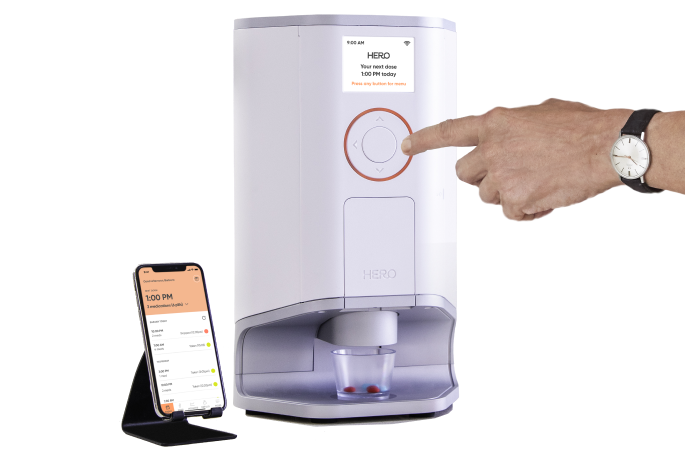Feeling Off? How to Gently Recognize and Prevent Medication Side Effects

Starting a new medication can bring a mix of hope and anxiety. You hope for relief, but you may also worry about potential side effects. Experiencing a new symptom can be confusing, leaving you to wonder if it's a temporary adjustment or something more serious. This concern is completely normal, and this guide is designed to help you gently navigate these feelings. We’ll explore what side effects are, how to spot them, and what you can do to feel more in control of your well-being.
What Are Medication Side Effects?
Medication side effects are essentially unintended reactions that happen when taking a medication. According to the FDA, these can range from mild issues, such as drowsiness or an upset stomach, to more serious symptoms like allergic reactions or liver damage.1
It’s important to remember that these effects aren't the same for everyone. How you react depends on the medication itself, your personal medical history, and any other medication or supplements you might be taking. The most common side effects people experience often include digestive issues like nausea, neurological effects like dizziness, skin rashes, or even changes in mood.
Why Do Side Effects Occur?
It can be frustrating when a medication meant to help causes other problems. Side effects often come down to how a specific medication interacts with your unique body, and they are frequently triggered by a few key situations.
Often, a simple change in your routine is the cause. Side effects can appear when you start taking a new drug or dietary supplement, stop taking a drug you’ve been on for a while, or when you change your dosage by increasing or decreasing the amount you take.
Taking multiple medications at once (polypharmacy) also increases the risk of drugs interacting in unexpected ways. Even simple mistakes with your schedule, like a missed dose or an accidental double-dose, can throw your body off and lead to unwanted reactions.
Finally, your own unique biology plays a significant part. Factors like your age, metabolism, and even your genetics all influence how your body will respond to any given medication.
How Can You Recognize a Possible Side Effect?
Trust your body. If you notice unusual changes in how you feel after starting a new medication, it’s worth paying attention. It can be incredibly helpful to keep a simple log of any new symptoms.
- Track what you're feeling. Note when a new symptom started, how often it happens, and if it gets better or worse over time. You can also record any patterns, such as if a symptom appears shortly after you take a dose. This information will be invaluable when you speak with your doctor.
- Read the label, but don't panic. The detailed information that comes with your medication can be overwhelming, but it's helpful to be familiar with the most common side effects listed.
- Ask for help. If you experience any new or worsening symptoms, don't hesitate to reach out to your doctor or pharmacist. They can provide peace of mind by helping you figure out if your symptoms are related to the medication or something else.
3 Simple Steps to Help Prevent Side Effects
Being proactive is your greatest tool for preventing side effects. It starts with open communication with your healthcare provider before you even begin a new treatment.
The best way to prevent side effects is to empower yourself with knowledge and consistency.
- Talk to Your Doctor Openly. Before starting a new medication, have a warm, honest conversation with your doctor. Provide a complete medical history, including any other prescriptions, over-the-counter drugs, and supplements you're taking.2,3 Be sure to mention any known allergies or past negative experiences with similar medications.
- Follow Your Schedule Precisely. Taking your medication exactly as prescribed is also crucial. Sticking to the right dose and timing helps your body adjust and reduces the risk of negative reactions.
- Be Mindful of Food and Drink. Ask your pharmacist if there are any specific things to avoid, as certain foods and drinks, like grapefruit juice or dairy products can interfere with how a medication works.5 Take meds with water and food (if recommended). If a medication can cause stomach upset, taking it with a glass of water and food can sometimes help.
When Should You Seek Help?
A quick note: This is a general guide and should not replace advice from your healthcare provider. Always consult them with any specific concerns about your health.
Knowing when to wait out a mild side effect versus when to call your doctor can be tricky. Not all side effects behave the same way. Some may appear when you first start taking a medicine but get better over time as your body adjusts. Others might only occur once in a while, while some side effects can be ongoing for as long as you take the medication.
If you experience uncomfortable side effects, it's best to talk with a healthcare professional before stopping your medication.4 Suddenly stopping can sometimes cause other problems or diminish the drug's effectiveness. Instead, use the following as a guide for when to reach out for professional advice:
- For Mild Side Effects: It's common to experience issues like slight nausea or drowsiness. While these often lessen with time, you are the best judge of your own body. If a side effect sticks around, bothers you, or makes you feel worried, it's always a good idea to bring them up with your doctor or pharmacist.
- For Moderate Side Effects: Don't ignore persistent symptoms like frequent dizziness, recurring headaches, or constant digestive upset. Reach out to your healthcare provider. They may recommend a dose adjustment or suggest a different medication.
- For Severe Side Effects: Seek medical help immediately if you experience a serious reaction like difficulty breathing, chest pain, swelling, or a severe rash. These could signal a dangerous allergic reaction or another urgent condition.
- Keep Up with Regular Follow-Ups: Routine check-ups are key. They allow your doctor to monitor how your body is responding to treatment and catch any potential issues before they become more serious.
Complex med schedule? We solved it.
Hero’s smart dispenser reminds you to take your meds and dispenses the right dose, at the right time.

Gain Confidence and Peace of Mind with Hero
The constant worry about making a mistake - missing a dose, taking it at the wrong time, or accidentally double-dosing, is one of the biggest sources of stress in medication management. This is where having a reliable system can make all the difference, giving you back your peace of mind.
Hero was designed to tackle this fear of error head-on. The service empowers you with tools that bring simplicity and safety to even the most complex routines:
- Simplify Your Routine: For those feeling overwhelmed by polypharmacy, Hero’s award-winning smart dispenser sorts and dispenses up to a 90-day supply of 10 different medications. It automatically provides the right pills at the right time, taking the stressful guesswork out of your day.
- Stay on Track with Gentle Reminders: Life gets busy, and it's easy to get distracted. The Hero app sends customizable alerts to your phone, helping you stay on track with your medication schedule. This offers a layer of support for your routine and helps you maintain the consistency that is so important for effective treatment.
- Peace of Mind for Loved Ones: For caregivers, the worry can be all-consuming. The connected app allows a medication partner to receive notifications if a dose is missed, providing reassurance that their loved one is staying on track without having to constantly ask.
A Quick Checklist for Managing Side Effects
If you or a loved one experiences a side effect, here are a few practical steps you can take:
- Stay Organized: Keep a simple medication journal to track your doses, symptoms, and side effects. This makes sharing information with your doctor much easier.
- Communicate Openly: Never hesitate to discuss side effects with your healthcare provider. Your concerns are valid, and open communication is the fastest way to find a solution.
- Ask About Alternatives: If a side effect is truly impacting your quality of life, ask your doctor if there are alternative medications or different treatment approaches you can try.
Navigating medication side effects is about being informed, observant, and proactive. By staying in close communication with your doctor and using tools that support consistency and accuracy, you can make medication management one less thing to worry about.
Sources:
1.FDA - Finding and Learning about Side Effects (adverse reactions) https://www.fda.gov/drugs/find-information-about-drug/finding-and-learning-about-side-effects-adverse-reactions
2. FDA - Create and Keep a Medication List for Your Health https://www.fda.gov/consumers/consumer-updates/create-and-keep-medication-list-your-health
3. Cleveland Clinic - Why Your Doctor Needs To Know What Supplements You’re Taking https://health.clevelandclinic.org/should-i-tell-my-doctor-what-vitamins-i-take
4.National Institute on Aging - Taking Medicines Safely as You Age https://www.nia.nih.gov/health/medicines-and-medication-management/taking-medicines-safely-you-age
5. AARP - 8 Foods That Don't Mix With Prescription Drugs https://www.aarp.org/health/drugs-supplements/food-medication-interaction
The contents of the above article are for informational and educational purposes only. The article is not intended to be a substitute for professional medical advice, diagnosis, or treatment. Always seek the advice of your physician or other qualified clinician with any questions you may have regarding a medical condition or its treatment and do not disregard professional medical advice or delay seeking it because of information published by us. Hero is indicated for medication dispensing for general use and not for patients with any specific disease or condition. Any reference to specific conditions are for informational purposes only and are not indications for use of the device.



